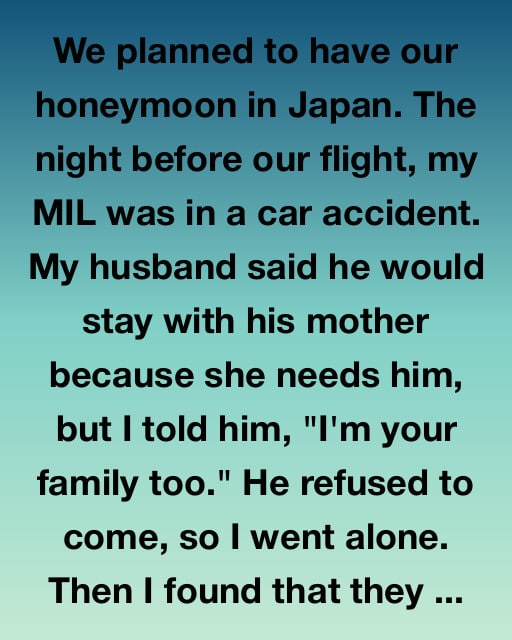We were supposed to leave for Japan the next morning. Our honeymoon, the trip we had been planning for a year, down to capsule hotels and cherry blossom walks. But the night before, his mother had a car accident. At least, that’s what I was told.
My husband said he couldn’t come. “She needs me more,” he said. I begged him, “I’m your family too.” He didn’t budge.
So I boarded the plane alone.
Two days later, scrolling on my phone in a Tokyo hotel, I found out the truth. His mother wasn’t fighting for her life. She wasn’t even close. A neighbor’s daughter had posted photos on Facebook: Eleanor smiling with a bandaged arm, holding chopsticks, laughing over sushi. The captions read: “Just a few stitches!” and “Already asking for sushi!”
My stomach dropped.
When I called, he sounded almost relieved, like he’d already chosen his side. “I thought it was better this way,” he said calmly. “Mom needed me more.”
But he’d left me.
Tokyo swallowed me whole that first week. Neon signs, trains that blurred like rushing water, strangers spilling through Shibuya crossing like an endless tide. I sat alone in ramen shops, pretending my photos were for him, pretending we were still a “we.”
The loneliness came quietly. In the spaces between temple bells and vending machines. I kept seeing his laugh in the reflections of store windows. Kept hearing his voice in karaoke booths he’d never sing in.
On my fourth day, it shifted.
In Kyoto, at a small café near Nishiki Market, an elderly woman leaned across the table. “You’re doing just fine,” she said in gentle English as I fumbled my order.
Her eyes held mine. “You look like you’re carrying something heavy.”
“I got left behind,” I admitted, barely above a whisper.
She nodded slowly. “Then it’s time you catch up—with yourself.”
That sentence cracked something open.
That night I made a new plan. No more pretending this was our trip. I booked a food tour in Osaka, signed up for a sushi-making class, hiked alone up Mount Inari where thousands of vermilion gates whispered me forward.
And somewhere between laughter with strangers and learning to order hot coffee correctly from Kenji—a soft-spoken Tokyo local who insisted I stop getting iced by mistake—I felt something unfamiliar.
I felt enough.
On my last night, I stayed at a ryokan. Tatami mats under my feet, paper doors sliding shut like a clean break. I watched the sunset stain the mountains gold and realized the woman flying home wasn’t the one who had boarded the plane.
When I landed, he was waiting with flowers. Nervous, smiling. “I missed you,” he said.
I looked at him—really looked. He seemed smaller, or maybe I had just grown.
“But you left me,” I said.
He blinked. “I didn’t think you’d actually go.”
And that was everything.
Weeks passed in silence between us, heavy as stone. Until one morning, I asked for a separation. He called it a mistake. I knew better. It was a mirror.
Japan had shown me who I was without him.
I moved into a small apartment, started volunteering to teach English to immigrants—remembering how hard it had been to feel voiceless in a new country. Life became quieter, but it was mine.
Six months later, I ran into Kenji in my city, sitting on a bench like it had been waiting for us. He was here for a conference. We got coffee. He told me I had inspired a project he’d started in Tokyo, connecting travelers with locals so no one felt invisible.
We kept in touch. Calls became visits. Visits became something steady, patient, real.
Three years later, I married him in a small Kyoto garden under the cherry blossoms. No grand plans. No drama. Just friends, vows, and love that didn’t need to be proven.
My ex sent one message: “I hope you’re well.” I wished him peace. And that was the end.
Japan was supposed to be a honeymoon. Instead, it was a beginning. A detour that became the destination.
Because sometimes the people who should choose you… don’t. And that hurts. But when you finally choose yourself, you open the door to a life that was always waiting.
So here’s to missed flights, solo journeys, and strangers who remind us who we are.
